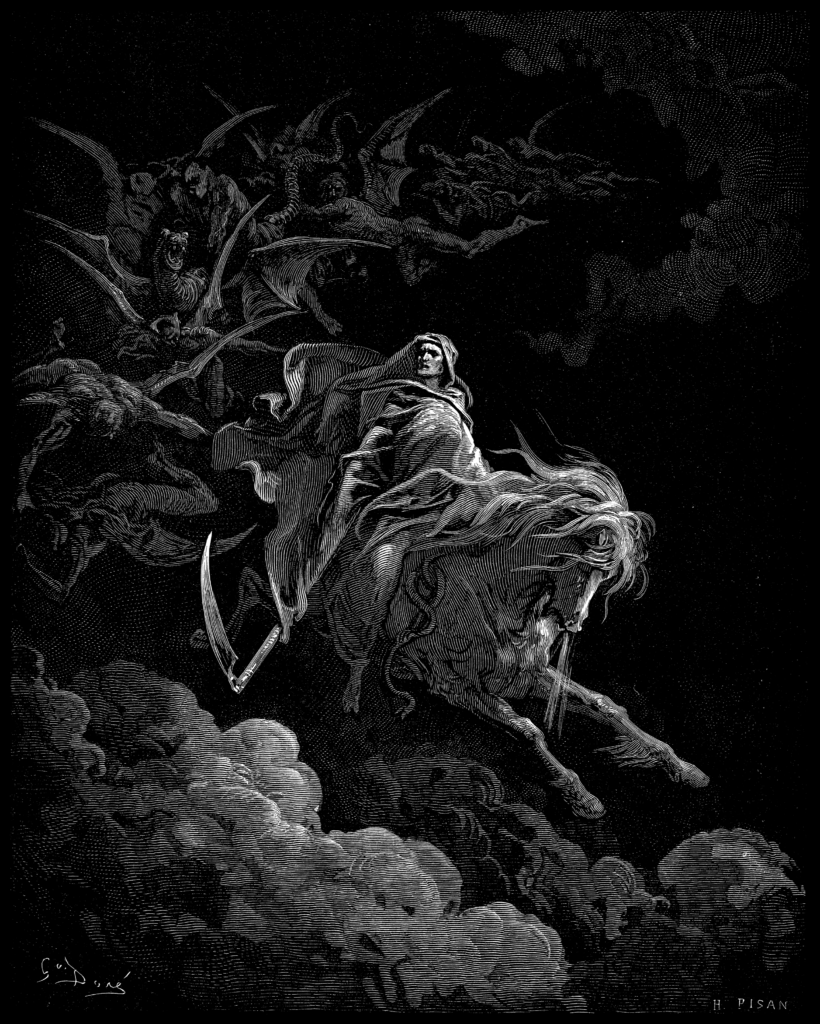
Gustave Doré, Death on the Pale Horse, credit Wikipedia
Das Rheingold
Music drama in four scenes, music and libretto by Richard Wagner, conducted by Sir Antonio Pappano, directed by Barrie Kosky, Royal Opera, 20th September 2023, reviewed by Leslie Jones
Indicatively, Wagner called Das Rheingold a music drama, as he despised the audience interruptions, primacy of arias and puerile plots of conventional opera. His ambition was to emulate the Ancient Greeks no less, by uniting all art forms into a Gesamtkuntswerk (‘total art work’). Indeed, according to the programme of the forthcoming ‘Congress of the International Verband Richard Wagner’, he single-handedly ended ‘the predominance of the singers and the voice’.
As Cosima Wagner recorded in her Diary, ‘I have composed a Greek chorus’, R exclaims to me in the morning, ‘but a chorus which will be sung, so to speak, by the orchestra’ (quoted by Eleanor Rosamund Barraclough, in ‘The Intermingling of the Human and the Divine’, Official Programme). Acting, however, has invariably been the weakest link in this chain. The cast of Barrie Kosky’s new production of Rheingold struggled to convey emotions and ideas via body language. And as critic Philip Hensher observed, the gods’ polo attire detracted from the work’s mythic elements (Front Row, Radio 4, 14th September).
There were strong vocal performances, nonetheless, notably by baritone Christopher Purves (Alberich), baritone Christopher Maltman (Wotan), mezzo-soprano Marina Prudenskaya (Fricka) and bass Insung Sim (Fasolt). Tenor Rodrick Dixon (Froh) has an exceptionally beautiful voice. For this reviewer, however, tenor Sean Panikkar as Loge was somewhat mannered and failed to sufficiently convey this character’s supreme intelligence, demonic cunning and amorailty. Wagner told Liszt that the world is ‘…evil, evil, fundamentally evil. It belongs to Alberich; no one else’ (Richard H Bell). Yet Loge outwits Alberich. We much preferred tenor Wolfgang Ablinger-Sperrhacke’s take, in Opera North’s semi-staged production of 2019.
Credit to set designer Rufus Didwiszus. His rotten, hollow tree trunk evokes the mythical World Ash Tree but doubles up as the Rhine, in scene 1, when Alberich pursues the Rhine Maidens and later, in scene 3, as the factory in Nibelheim, where the gold is being processed.
For Wagner, the Ring ‘contains [both] the beginning and the end of the world’. Earth Goddess Erda’s appearance, traditionally in scene 4, recalls both the opening of Das Rheingold (the creatio ex nihilo) but also the intimations of cosmic destruction at its end. Wagner pointedly added one key line to Erda’s prophecy, to wit, ‘Everything that is, ends’. And unlike previous productions, Erda (played by actress Frances Campbell), ‘elderly, naked, frail, vulnerable’, is an omnipresent presence throughout (Zachary Woolfe, The New York Times, Sept 12, 2023). This, as Barry Millington observes, is ‘Kosky’s most striking invention” (Evening Standard, 12th September). It was especially moving and compelling in the finale. We evidently still care for our imperilled home. Kosky’s vision of humanity’s future is unapologetically apocalyptic. ‘The world’s going to burn and then flood’, he predicts (discussion with AJ Goldmann, ‘Dreams, hallucinations and visions of mother earth’, Official Programme).
According to Kosky, interviewed by Katie Derham, In Tune, September 7th working with conductor Sir Antonio Pappano, now in his final season as Music Director, was a ‘joy and privilege’, thanks not least to his ‘innate theatrical instinct’. For the orchestra and its conductor, he added, over two hours without a break represented a challenge. It was a challenge that they rose to with aplomb.
Dr Leslie Jones is Editor of Quarterly Review











Didn’t Wagner think we could overcome the prospect of abyss?
Parsifal supersedes Siegfried?
Overture to Rienzi?
Can anyone leave the theatre today – um die Nation zu retten?
Radio 3 said this morning that the ‘CEO’ of a North Carolina radio station has decided that the network will not broadcast ‘modern operas’ that deal with woke/LGBT themes. Sharp intake of breath at the BBC! However, I wonder what would happen if I wrote the libretto to a pro-Brexit opera and asked the Beeb to clear space on the airwaves for it? Can you imagine the response?! Censorship works both ways…